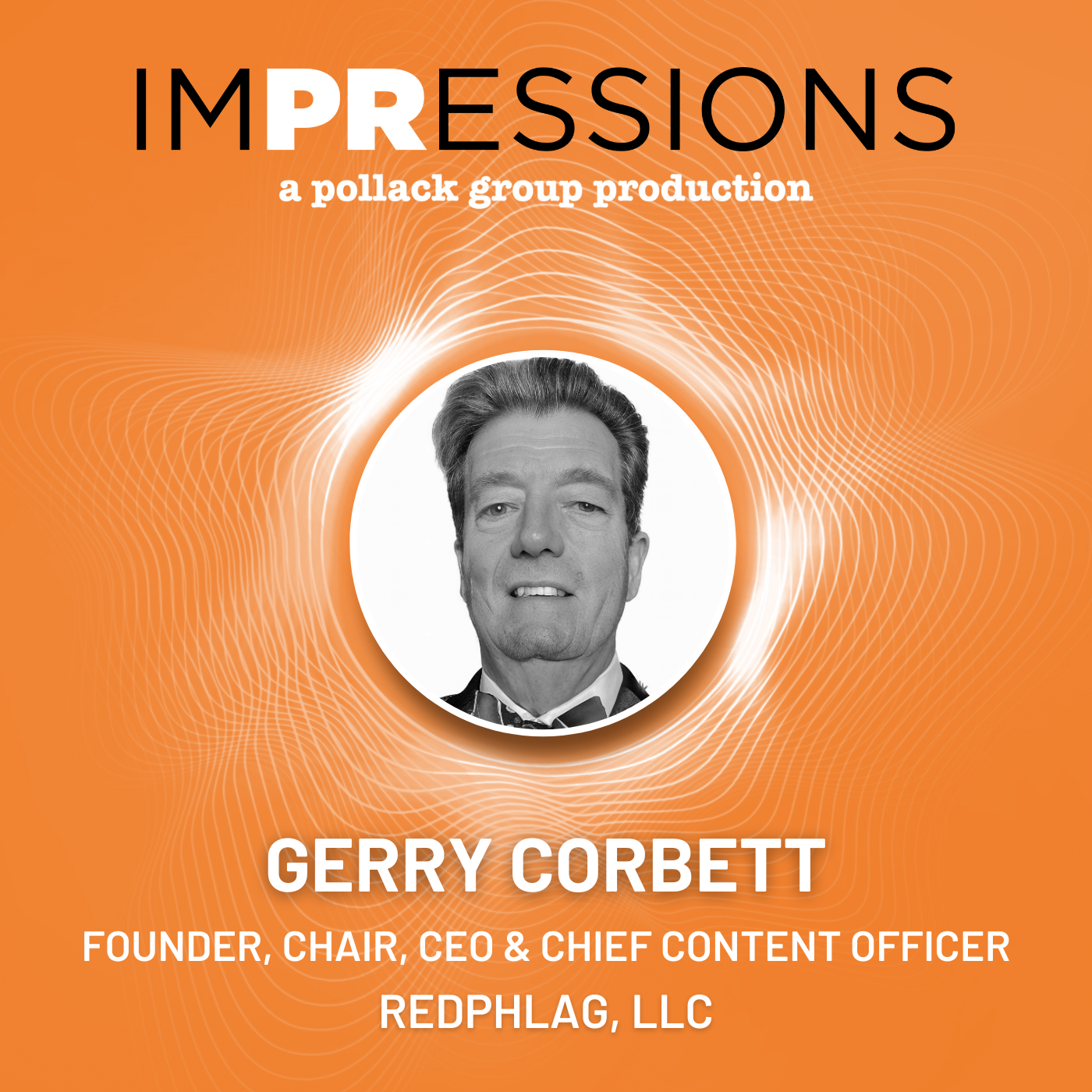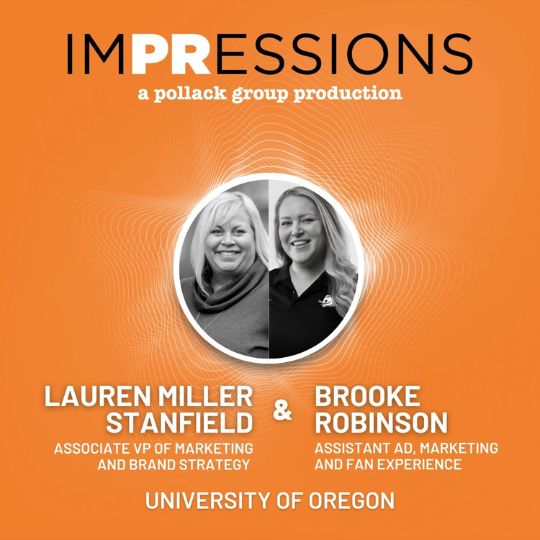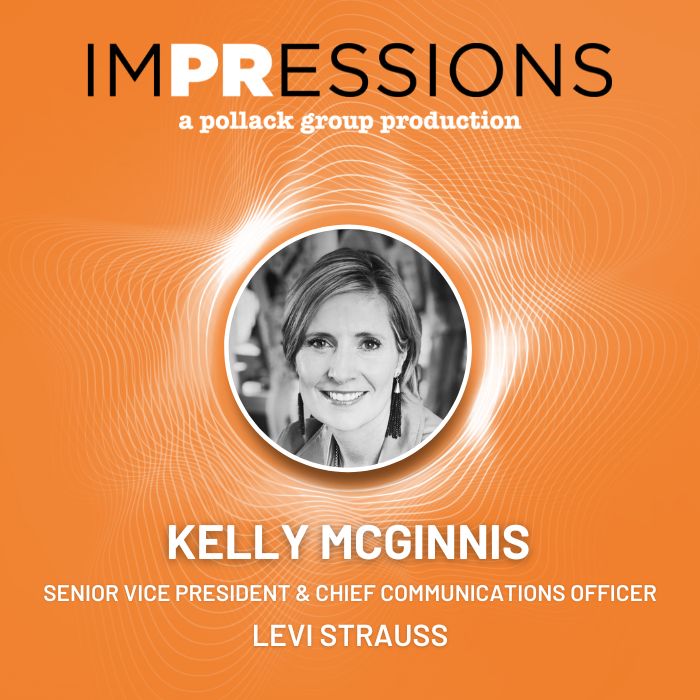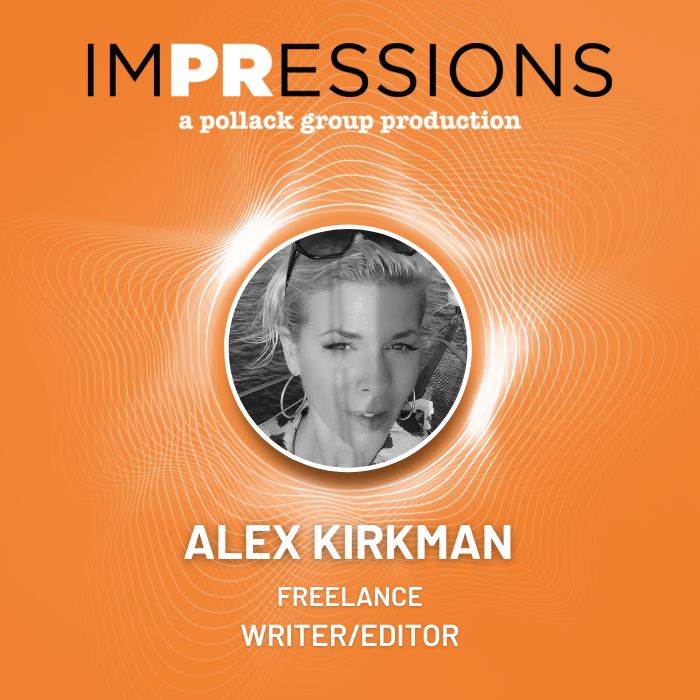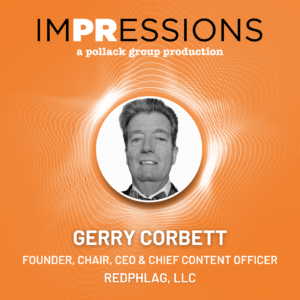 It’s no secret that PR specialists grapple with the responsibility of building and maintaining trust while also adhering to values and a robust code of ethics. In episode 20 of imPRessions, we explore the crucial role that ethics plays within the PR industry, ensuring that both the media and the general public receive information that is not only accurate but also fair. Gerry Corbett, an accomplished strategic communications leader, consultant, and educator with extensive experience in Fortune 200 companies and start-ups, joins us to share his insights into navigating the moral compass that often challenges CEOs and organizations.
It’s no secret that PR specialists grapple with the responsibility of building and maintaining trust while also adhering to values and a robust code of ethics. In episode 20 of imPRessions, we explore the crucial role that ethics plays within the PR industry, ensuring that both the media and the general public receive information that is not only accurate but also fair. Gerry Corbett, an accomplished strategic communications leader, consultant, and educator with extensive experience in Fortune 200 companies and start-ups, joins us to share his insights into navigating the moral compass that often challenges CEOs and organizations.
imPRessions Episode #20 Transcript
Kalli: Ethics is crucial in the business world, and PR is no exception. As the industry is centered on trust and building brand credibility, PR specialists need to adhere to their own values and code of ethics, ensuring both the media and general public are receiving accurate and fair information. Gerry Corbett is no stranger with helping businesses stay ethical through various PR strategies, and is here today to share his expertise as we continue to see various CEOs and organizations struggle with navigating a moral compass.
Jenn: Hi Gerry, thanks for joining us today.
Gerry: Good day, and thank you for having me. I appreciate it.
Jenn: Please, it’s our pleasure. So we’re really excited about this topic. It’s a really, really important one. You’ve had extensive experience in public relations. You know, across the industry. You currently serve as the chair and CEO of Red Flag, a consulting firm that specializes in PR, marketing, career coaching, the whole shebang. Tell us a little bit about your role at the agency.
Gerry: I started the Firm in 2008 after I left Hitachi after more than a dozen years. Uh, we mainly focus on strategic public relations. We don’t, you know, we don’t get into, uh, daily activities and social media and that sort of thing. We mainly keep it at a higher level, focused on strategy and other specialized functions like senior management, coaching, and career coaching. So I’ve been doing it since 2008, after more than mainly corporate communications and earlier in my career in the agency. So I’ve done things like media training for CEOs in tough situations ranging from crisis to, uh, faux pas in the marketplace. And it’s a range of companies, from startups to established firms. And I do a little bit of, uh, of consulting on, uh, Chinese and Japanese firms that that are doing business here.
Kalli: That’s really interesting. And I actually wanted to take it a little bit further back before you launched a career in PR, you were a programmer for NASA. What made you change career paths, and do you see any similarities between the two? No pun intended…uh, worlds?
Gerry: You know, that’s a that’s a good question. I actually when I graduated from high school, I was on the fence about what I wanted to do long, long term. And my dad was, uh, civilian engineer for the US Navy. And so I thought I’d try my hand in engineering. So I, uh, majored in electronics engineering at a community college in Philadelphia. And after two years, my twin brother and I decided to move from Philadelphia to California. You know, the old adage, uh, go west, young man. So we moved to California. We had 50 bucks between us and a car. And so we headed west. So because of my early engineering training, I was looking for a role in California and ended up in engineering at the National Aeronautics and Space Administration. So I was primarily doing data acquisition on wind tunnel tests on aircraft and spacecraft. And so I was on the shuttle program early on because these wind tunnels use so much power. I consistently worked the graveyard shift. So I took advantage of that. Enrolled in a public relations degree program at San Jose State. So, the bridge really was to use my engineering background to create a niche in technology PR. And back in the early 70s, that was an unusual path, I guess it was. So the transition really was, was going from engineering to PR, but specializing in technology communications. So that’s really how I made the bridge. And I think the similarities are, you know, particularly related to ethics is precision and transparency. Both of those characteristics are required in the PR field as well as the engineering field.
Jenn: Absolutely. And I think it’s fair to say, you know, ethics plays an important role across. All industries. Of course, there isn’t one industry in particular that doesn’t need to adhere to some type of code of conduct, but I feel like maybe more so, a little bit more in PR because the media and, you know, consumers and the general audience that we have, they need to trust that what we’re saying is, is legitimate. So I guess what I would like to know is somebody like yourself, who has been conducting ethics and PR for quite some time, what are some ways that PR specialists need to incorporate ethics into their everyday work?
Gerry: That’s easy. Just honesty, transparency, and integrity. I mean, if you look at the field today, it’s it is littered with ethical breaches and particularly in the C-suite. But it goes well beyond the C-suite because that’s, that’s the most attractive from a news standpoint. But, you know, it’s interesting, i’ve been thinking about this a lot. And just two days ago, I got an email from ostensibly a public relations firm pitching me on their services. And what struck me was the URL of the firm and its pay on results pr.com. I was absolutely flabbergasted that a firm would sort of pitch their skills based on getting results. And to me, it doesn’t seem wholly ethical that that’s an ethical business model. And I’ve seen many other businesses that are the same way. I do a fair amount of career coaching, and I came across a young professional who was asking me about this website, right where you can go and you can buy an essay from them. Like, they’ll write the essay for you. They will write the essay, and the entry point is, or the starting price is $16.
Jenn: Where was this when I was in college?
Gerry: But you have to see this because the website has a lot of typos in it.
Jenn: Oh, it’s not okay, but it’s crazy.
Gerry: It’s called scholarlyessay.com, one of the papers they have; it says organizational behavior and management concept. But management is misspelled. So I don’t know whether that’s designed that way. But our industry faces all of these different services. Some are completely transparent, and others are simply not. So, if you’re in high school and you are exposed to this stuff, what does that tell you about how you should run your life? How should you manage your career? I think it’s important early in your career to dedicate yourself to complete honesty and always doing the right thing. And frankly, you know, parents probably have the most influence on that kind of mentality. And so I always lecture to people about always doing the right thing. Be true to yourself, always be honest. Because if you’re not honest, eventually, you’re going to get caught.
Absolutely. And I’d like to just go back to what you were saying before about somebody pitching you. I think pitching in general in PR, you know, a specialist will pitch out to the media for a story, you know, to get client coverage. That’s the basis of, you know, what a lot of agencies do. But there are PR firms and, in particular, people that run into ethical issues because of the way they pitch. They are aggressive, or they follow up relentlessly, or they don’t really follow the reporter’s work or really know what the reporter is writing about. So they’re pitching them nonsense. I think, in itself, we could probably have our own episode and discussion around just ethics and pitching in public relations.
Gerry: Well, yeah. And the point that you made about knowing who you are pitching is just critically important. And every PR person needs to do a deep dive into the media that they want to pitch and learn everything about the media, learn everything about the reporter that you can learn. Because if you try to pitch and you only know a quarter of the story or half the story, the pitch is going to fall flat and the reporter is going to recognize it immediately. You know, that’s that’s all part of having an ethical mindset. You know know what you’re doing, analyze, study everything. Read as much as you can about the particular media that you’re trying to pitch. And don’t try to sell snake oil because it’s not going to work. And all you’re going to do is harm yourself, harm your company, or harm the agency that that you’re working for. You know, what was it last year we learned about this agency owner who created a media title online for purposes that were incredibly ethical?
Jenn: Oh, we know all about that.
Gerry: Yeah, exactly. And believe it, or not, the agency is still in business. And I don’t know how they can do it but particularly do it with a straight face. But the principal stepped aside and, they put in a new CEO. But whether that changed their business model, I don’t know. But I stopped following them just because there’s no credibility or honesty at all in their business model.
Kalli: You know, it’s so important to have a leader that does have an ethical, moral compass. And I’m familiar with the case that you’re, you’re talking about, but, you know, not even just in PR but, you know, from Theranos to Elon Musk, our country as a whole has really experienced an influx of top CEOs and founders that just really lack that ethical moral compass. Why do you think this is? And like, you know, how do they deal with, you know, having people work with them or like you said, with this company, you know, they’re still in business. Like, how does that happen?
Gerry: Ah, boy, that’s the $64,000 question. And some of them manage to last a while. It’s crazy. I mean, clearly, Theranos got caught with their hand in the cookie jar. And the alleged CEO, up until the present day, has tried to skirt responsibility. It’s just unbelievable that The New York Times just did a piece about this person last week.
And it’s just it’s unbelievable how much this person got away with just amazing. But, you know, I think that part of the problem is money. It’s absentee board members that are not paying attention. Just look at Fox News. I mean, if I was on the board at Fox News, I would have raised the red flag a long time ago. But, you know, it just hasn’t happened. And be honest with you. Power corrupts. And we’ve seen it time and again, even back in the 70s and 80s when I started my career, there were ethical breaches. And I vividly recall a Businessweek cover story about a major medical firm whose CEO went rogue. So, this is not a new phenomenon. This has been with us for a long time. And I think it’s incumbent upon PR professionals to actually be the conscience of the organization, and if you see bad behavior called out, and if that doesn’t result in action or changes, then move on. But I think if you’re in a firm where you witness unethical behavior, I think it’s incumbent to do something about it. Your career will not be harmed because people recognize good people. So I think, you know, people like ourselves need to be the conscience of the organization and help the company always do the right thing. Unfortunately, with some firms, as we know, they have gotten rid of their communications departments and have done it themselves, but their market valuation is currently reflecting some of that bad behavior.
Jenn: Yeah. And I completely agree with you when you say that, you know, some of the unethical behaviors that we’re seeing today isn’t anything new. I think it’s just that we have news delivered to us so fast today with social media and text messaging and emails when we didn’t really quite have that back in the day. So maybe people weren’t as aware of some of the things that were happening. Unless you had a killer reporter who did the investigative work and published a story about it, it wasn’t as easy for someone to just tweet and say, hey, this company is doing XYZ as it is to.
Gerry: Well, that’s true. As a matter of fact, you know, just this morning, I don’t know whether you read The Wall Street Journal, but there’s a horrifying story about Instagram today and child pornography. Oh, and it’s a very lengthy piece. But there were studies by MIT and Stanford who helped this reporter at the Wall Street Journal analyze algorithms and set up profiles and that sort of thing, and it is an absolutely horrifying story. I expect that Congress or someone will start drilling down about this story today… just unbelievable.
Jenn: Wow. Yeah, that’s not surprising, though, because I, you know, social media, it has been sort of playing into ethics. And that’s actually my next question for you. So this is a good segway. But what the many different platforms that people utilize today, Instagram as you just said, and TikTok and Twitter, do you feel that there are certain platforms that impact how users experience and maybe view ethical dilemmas? Do you think social media can sway whether or not somebody thinks something is as bad as it’s coming across?
Gerry: You know, that’s another good, good question. I think that the PR professional really needs to be diligent on the application of social media. Social media today is sort of replacing mainstream media, and unfortunately, the average person is getting their news from social media platforms TikTok and Instagram and even Facebook and LinkedIn and some of these more extreme platforms that are being used that we don’t even know about. So I think, you know, the PR professional really needs to scrutinize the channels that they’re employing to communicate their client or their company’s messages and apply the same discipline that you would with traditional media, whether it’s television or radio or newspapers or magazines, you know, the skills required today are no different than they were 30 or 40 years ago. It’s, you know, being able to strategically analyze how you want to communicate, what channels you want to employ, and what the messages are. And even though social media is proliferating at a rapid rate, the process or processes and the discipline that we use to do our job really hasn’t changed. It’s an ethical mindset. It’s being able to think strategically. It’s being able to act quickly, particularly in the face of urgent crises. It’s more important today than it ever was.
Kalli: That’s so true. And just thinking about all these things, you know, can you provide advice for a professional that is experiencing problematic ethics at their job? You know, how should people deal with this? You know, if you’re working for a company like that or you found yourself in the middle of a situation?
Gerry: Well, you know, I had a situation several years ago where the company that I was working for had announced its financial results and afterwards discovered some financial misdeeds. And it was a new CEO. They had just been featured in a major financial publication about what they were going to do to fix the company and its problems when this financial problem occurred. And so I did battle with the general counsel on how to address the issue. I wanted to bring the publication back in to talk to the CEO. About how this could have happened and what he was going to do to fix the problem, and the lawyers didn’t want to do it. So I spent an entire weekend with the CEO, going over all sorts of scenarios about how he could address the issue and how he could gain his credibility back. Those two days with this person paid off, and we brought the reporter back in, and he wrote a critical but complementary story, a second story a week later about this company and the CEO. So, the lesson for me, and I think the lesson for any PR pro, is stick to your guns, be honest, be open, be transparent. Don’t fear the worst. Fight for your credibility and be honest. Try to convince management about the importance of their integrity and always doing the right thing. And it’s a personal thing. You know, I could have gotten dismissed by the company for going against the lawyers, but I felt it was important to give the facts to the CEO and lay out the scenarios and take the consequences. So my advice is just stick to your guns. If you see some behaviors that can hurt the company or counter to the company’s mission, you know, speak up and fight for it.
Kalli: That’s really great advice. And, you know, as PR specialists continue to navigate the murky waters of political dilemmas and internal cover-ups, you know, that just goes to show there’s really one rule of thumb to keep in mind. Stay honest. This was an important yet incredible discussion and a concrete reminder of the importance of remaining ethical, whether in business or your personal life. And you’ll never regret being moral. Thanks for your time today, Gerry, and thanks to our listeners for checking in with us. We’d love to hear from you. Email us at imPRessions@pollackgroup.com anytime to say hello.

